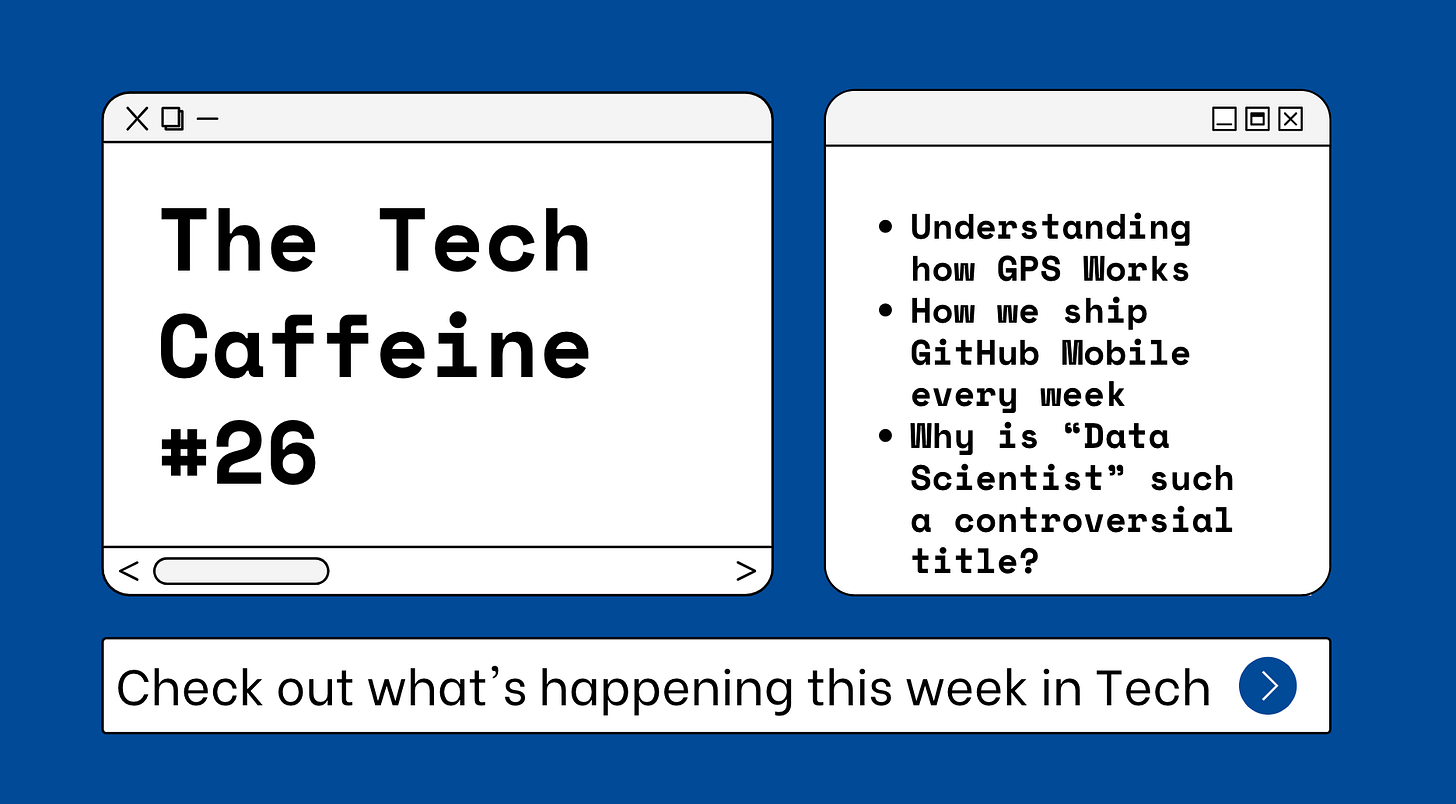☀️ The Tech Caffeine #26: This Week in Tech
Understanding how GPS Works, How we ship GitHub Mobile every week, Why is “Data Scientist” such a controversial title?
💌 The essence of the web, every morning in your inbox.
Join tens of thousands of smart people who start their day with their personalized digest by Refind. Subscribe for free.
📍 Understanding How GPS Works
The Global Positioning System is, without a doubt, one of the most useful inventions of the late 20th century. It made it significantly easier for ships, airplanes, cars, and hikers to figure out where they are with a high degree of accuracy.
However, the satellites are just a part of what makes GPS possible. While I’ll discuss their motion-in-depth, over the course of this blog post I’ll also explain how the satellites help a GPS receiver determine where it is, and I’ll dive into the clever methods the system uses to make sure the signals are sent all the way from space are reliably decoded on Earth.
I am big fan of Bartosz Ciechanowski’s writing, he spends a good amount of time in writing his article is every article is a worth read. Don’t forget to checkout his previous article’s as well.
🚀 How we ship GitHub Mobile every week
Every week, the GitHub Mobile team updates the GitHub Mobile apps on both iOS and Android with new features, bug fixes and improvements. Shipping a mobile app is not an easy task. Before a build goes out to our users’ hands, we must make sure the end result is properly built, all written tests are passed, and any critical issues are captured by testing. Also, we compose release notes with changes since our last update. All of these tasks can be quite time-consuming.
🛑 AngularJS Officially Reached End of Life
In January of 2018 we laid out our plans for the final releases of AngularJS before entering long-term support and last year, we extended the LTS due to the global pandemic until December 31, 2021. Well, friends, the time has come and we’re no longer supporting AngularJS.
We encourage teams to upgrade their applications to the AngularJS successor Angular and benefit from productivity, scalability and improved performance. For teams still using AngularJS, please check out this post to explore some options.
🌍 FOQS: Making a distributed priority queue disaster-ready
FOQS is the priority queuing service that ensures reliable message delivery among many of Meta’s apps and services. For example, it is the platform for delivering messages that people leave on Facebook to let friends and family know they are safe in situations like an earthquake. Given the important role that FOQS plays, it must be resilient to large-scale disasters such as the complete failure of an entire data center or region, or planned outages when maintenance is being performed on a data center.
❓ 10 questions to help boards safely maximize cloud opportunities
The accelerating pursuit of cloud-enabled digital transformations brings new growth opportunities to organizations, but also raises new challenges. To ensure that they can lock in newfound agility, quality improvements, and marketplace relevance, boards of directors must prioritize safe, secure, and compliant adoption processes that support this new technological environment.
👩🏻🔬 Why is “Data Scientist” such a controversial title?
I remember the first time I heard the term “Data Scientist.” It was 2012, and I was at a going-away party with other physicists at CERN to celebrate a friend who was headed back to the US to become one. At the time I remember thinking that the title was kind of pointless; a scientist is nothing without data, so adding “data” to a career title that I already held seemed tautological.
Fast forward to almost a decade later, and there’s a healthy debate1 in the industry over what Data Science actually means, and if “Data Scientist” is a pernicious title. I’d like to argue that the role of a “scientist” is something that industry has yet to capitalize on and that if we imprudently get rid of it, we’ll be missing an opportunity to foster a valuable mindset within the product development process.
👨🏻🏫 Introduction to WebAssembly components
WebAssembly (or Wasm) is a W3C specification for a portable binary format for distributing and running code that has been implemented in the four major browser engines since 2017. In familiar terms, Wasm is used as a compilation target for various programming languages, generating a compact binary that can run at near-native speeds in the browser.
This brought existing languages such as Rust, C and C++, Go, or C# (and new languages like Grain ) to the web, and enabled porting extremely complex applications such as Google Earth or Photoshop to the browser.
🐥 Tweet of the Week







